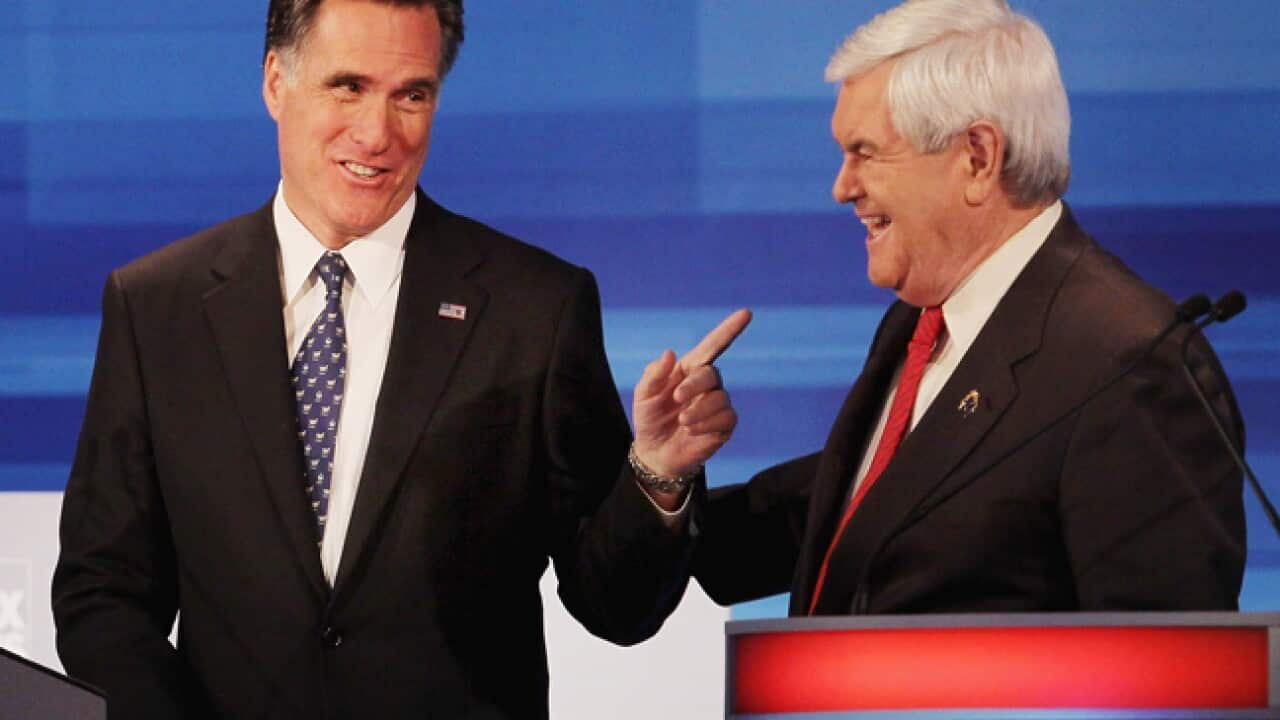Dubbing frontrunner and multimillionaire businessman Romney a "predatory corporate raider," the ads are the brainwave of a so-called "super PAC" or political action committee and will run ahead of the South Carolina primaries later this month.
The "Winning the Future" PAC was formed in December to back former US House speaker Gingrich, who has been sagging in the polls as he seeks the Republican Party nomination to take on President Barack Obama in the November elections.
Gingrich himself saw a brief bump in his support crumble in last week's Iowa nominating contest in face of a series of attacks on him from a group linked to the Romney campaign.
Romney, a former Massachusetts governor, who won Iowa by just eight votes, looks set to repeat his success in Tuesday's New Hampshire vote, where polls give him a double-digit lead with Gingrich badly trailing.
He has been pressing his message that as the former chief of private equity group Bain Capital, he has the credentials to get the faltering US economy moving again.
But as the gloves come off, Gingrich's supporters say Romney "was not a capitalist during his reign at Bain. He was a predatory corporate raider."
"His firm didn't seek to create value. Instead, like a scavenger, Romney looked for businesses he could pick apart. Indeed, he represented the worst possible kind of predator, operating within the law but well outside the bounds of what most real capitalists consider ethical," the PAC said.
PAC spokesman Rick Taylor told AFP the group intends to spend at least $3.4 million on the ads ahead of the January 21 primary in South Carolina. The New York Times reported that billionaire casino mogul Sheldon Adelson has donated $5 million to the group.
Television ads set to run ahead of the South Carolina primary depict unseen people counting money from a suitcase with $100 bills and show interviews with those who claim to have lost their jobs after their companies were taken over.
At Bain, Romney's mission was "to reap massive rewards for himself and his investors," say the ads, which seek to tap into voter angst on the economy and joblessness.
The narrator says Romney "took foreign seed money from Latin America and began a pattern exploiting dozens of American businesses."
"He sent jobs overseas or killed them altogether, and then picked apart the remains -- including pension funds -- before the companies went bankrupt."
Campaigning in New Hampshire, Romney on Monday angrily denounced attacks by his rivals and said "free enterprise will be on trial" in Tuesday's primary.
"I thought it was going to come from the president and the Democrats from the left, but instead it's coming from speaker Gingrich," he said on the factory floor of Gilchrist Metal Fabricating after a rally with supporters.
The group backing Gingrich is among the so-called "super PACS" which, following recent Supreme Court rulings, can raise and spend unlimited funds without being subject to the same limits imposed on individual candidates.
Last month Gingrich denounced attacks on him from a committee linked to Romney called "Restore Our Future" and urged Romney to stop the ads.
Kathryn Dunn Tenpas, a University of Pennsylvania political scientist, said such negative ads in the primaries are not new, but that now, "Newt Gingrich is desperate. If he doesn't do well in the next couple of primaries, he's out."
Tenpas said that even though the PACs are technically independent, they can change the campaign and tip the balance in favor of candidates or supporters with big warchests.
Political scientist Larry Sabato of the University of Virginia said the "super PACs" have changed the game in terms of disclosure of campaign finance.
"If people can give large sums and stay off the radar screen, then they can gain hidden influence with no risk," he told AFP.
Gingrich is polling around eight to 12 percent in New Hampshire ahead of the Tuesday primary. But the Georgia politician has already narrowed the gap in South Carolina where he has around 20 percent support.

